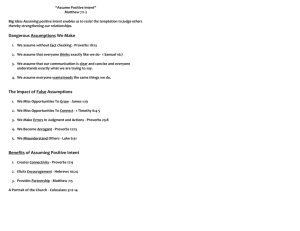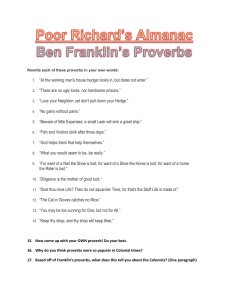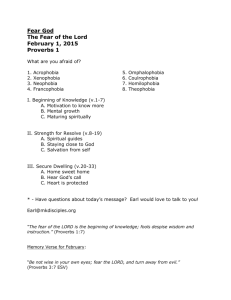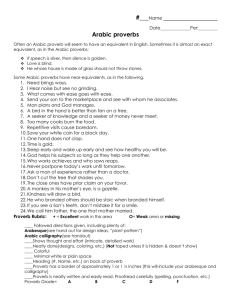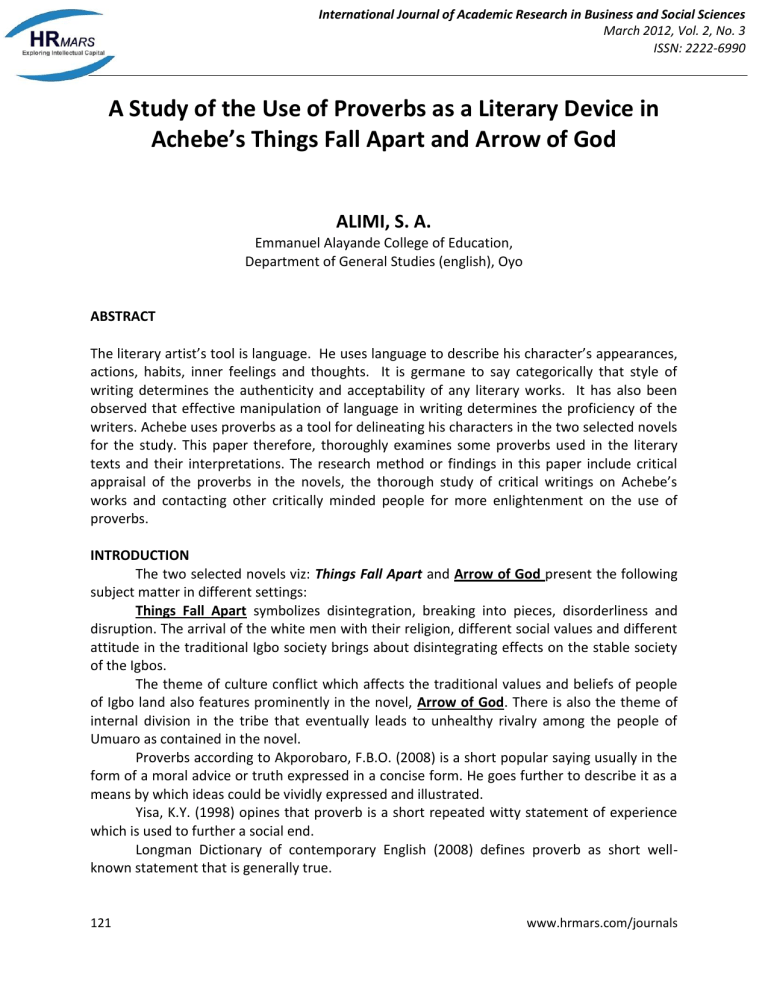
International Journal of Academic Research in Business and Social Sciences March 2012, Vol. 2, No. 3 ISSN: 2222-6990 A Study of the Use of Proverbs as a Literary Device in Achebe’s Things Fall Apart and Arrow of God ALIMI, S. A. Emmanuel Alayande College of Education, Department of General Studies (english), Oyo ABSTRACT The literary artist’s tool is language. He uses language to describe his character’s appearances, actions, habits, inner feelings and thoughts. It is germane to say categorically that style of writing determines the authenticity and acceptability of any literary works. It has also been observed that effective manipulation of language in writing determines the proficiency of the writers. Achebe uses proverbs as a tool for delineating his characters in the two selected novels for the study. This paper therefore, thoroughly examines some proverbs used in the literary texts and their interpretations. The research method or findings in this paper include critical appraisal of the proverbs in the novels, the thorough study of critical writings on Achebe’s works and contacting other critically minded people for more enlightenment on the use of proverbs. INTRODUCTION The two selected novels viz: Things Fall Apart and Arrow of God present the following subject matter in different settings: Things Fall Apart symbolizes disintegration, breaking into pieces, disorderliness and disruption. The arrival of the white men with their religion, different social values and different attitude in the traditional Igbo society brings about disintegrating effects on the stable society of the Igbos. The theme of culture conflict which affects the traditional values and beliefs of people of Igbo land also features prominently in the novel, Arrow of God. There is also the theme of internal division in the tribe that eventually leads to unhealthy rivalry among the people of Umuaro as contained in the novel. Proverbs according to Akporobaro, F.B.O. (2008) is a short popular saying usually in the form of a moral advice or truth expressed in a concise form. He goes further to describe it as a means by which ideas could be vividly expressed and illustrated. Yisa, K.Y. (1998) opines that proverb is a short repeated witty statement of experience which is used to further a social end. Longman Dictionary of contemporary English (2008) defines proverb as short wellknown statement that is generally true. 121 www.hrmars.com/journals International Journal of Academic Research in Business and Social Sciences March 2012, Vol. 2, No. 3 ISSN: 2222-6990 Yisa, K.Y. (2004) citing Grigas, Krikmann, Louis, Mieder, and Seitel is of the opinion that short, cleverly constructed belief statements which are used to perform different functions in society. One of such functions is to help users to say unpleasant things in an ameliorated way. They are able to do this because proverbs are often associated with common or traditional (i.e. longstanding) wisdom or attitude. Crystal David (1995:184) comments on the nature of the proverbs: The effectiveness of a proverb lies largely in its brevity and directness. The syntax is simple, the images vivid, and thus easy to understand. Memorability is aided through the use of alliteration, rhyme, and rhythm. Proverbs could be described as short, popular witty sayings with words of advice or warning. Proverbs could also be viewed as a repository of native intelligent, code of moral laws and philosophy of both life and social justice. We can infer from the definitions of proverbs citied above that: They are kernel which contains wisdom of the traditional people and they are also philosophical. They are moral expositions shrunk to a few words because it is didactic. Proverbs are also used to suit every situation and occasion. This is because every significant affirmation traditional value or belief can be strengthened and supported with the use of appropriate proverbs. Social problems and personal difficulties can also be settled by an appeal to the sanctioning proverbs. The use of proverbs as a literary device Achebe (1958) comments on the importance of the use of proverbs among his people hence, he says “among the Ibo the art of conversation is regarded very highly, and proverbs are the palmoil with which words are eaten”. Furthermore, the use of proverbs is inevitable because they are highly prized in the traditional African society and are used to portray certain actions or events in picturesque manner. The Concepts of Style and Literary Device Abrams, M.H (1981) posits that style is the manner of linguistic expression in prose or verse. It is how a speaker or writer says whatever it is that he says. He also opines that the characteristic style of a work of a writer may be analysed in terms of its diction or choice of words; its sentence structure and syntax; the density and types of its figurative language, the patterns of its rhythm, component sounds, and other formal features, and its rhetorical aims and devices. Style could be described as mode or manner of expression of a writer, especially a literary artist. Wiki, the free Encyclopedia (2012) posits that: A literary technique (also, literary device, procedure or method) is any element or the entirety of element a writer intentionally uses in the structure of the literary work. It can be for example, an identifiable rule of thumb, a convention, 122 www.hrmars.com/journals International Journal of Academic Research in Business and Social Sciences March 2012, Vol. 2, No. 3 ISSN: 2222-6990 a literary motif, an organization that is employed in literature and story telling, or the absence of them. The definition above simply refers to the way the language is used by an individual writer. It also implies the techniques or strategies employed by a writer to use language in a particular context. Ndudim, C. (1999) commenting on the devices of literary creation opines that: One of the basic differences between imaginative literature and other forms of expressions in print is the language and the way words are patterned or created to draw our attention to the experiences writers present. Ndudim identifies images and imagery, figurative expression, symbolism, etc. as literary devices that could be used by a writer to present his literary works. Bolorunduro, H. M. (1974) comments on Achebe’s style, he posits that: Achebe has developed not one prose style but several and in each novel he is careful to select the style or styles that will best suit his subjects. He goes further to submit that Acbehe depicts a high sense of literary ability by using other devices which have done great credit to the novel, Things Fall Apart. He identifies flash back method, economic use of language, transliteration or literal translation, clarity in the choice of diction, proverbs, etc. as literary devices used in the novel. The focus of this paper therefore, is the use of proverb as literary devices in the Things Fall Apart and Arrow of God. Achebe intentionally uses the proverbs not merely to add touches of local colour but to sound and reiterate themes, to sharpen characterization, to clarify conflicts and to focus on the values of the society he is portraying. Let us examine the proverbs below as contained in the two novels selected for the study. Proverbs in Things Fall Apart We have the following proverbs, among others “The lizard that jumped from the high iroko tree to the ground said he would praise himself if no one else did.” The proverb is used to acknowledge Okonkwo’s diligence, especially as a young farmer. Let us examine the excerpt below as reflected in the novel. “I have come to you for help’, he said ‘Perhaps you can already guess what it is. I have cleared a farm but have no yams to sow. I know what it is to ask a man to trust another with his yams, especially these days when young men are afraid of hardwork. I am not afraid of hardwork. “The lizard that jumped from the high iroko tree to the ground said he would praise himself if no one else did.” I began to fend for myself at an age when most people still stuck at their mothers’ breast. If you give me some yam seeds I shall not fail you (pp. 15-16). 123 www.hrmars.com/journals International Journal of Academic Research in Business and Social Sciences March 2012, Vol. 2, No. 3 ISSN: 2222-6990 The above excerpt reflects how Okonkwo goes to Nwakibie to seek for help after clearing his farm in preparation for planting yam. Nwakibie responds positively to his request. Proverbs are used at crucial moments in the lives of the characters in the novel, Things Fall Apart. For instance, at the last meeting of the Umuofia community, Okika punctuates his speech with many proverbs, one of the proverbs is “wherever you see a toad jumping in broad daylight, then know that something if after its life.” This proverb is used to enlighten the reader on the purpose of the meeting, the burning issue for which they have summoned the meeting. Let us examine the excerpt below: You all know why we are here my father used to say to me, wherever you see a toad jumping in broad daylight, then know that something is after its life”. Another proverb in the novel, uttered by Okonkwo is “I cannot live on the bank of river and wash my hand with spittle.” This proverb connotes Okonkwo’s protest against Ekwefi for her frugality in the preparation of the feast intended to mark his departure from Mbanta. The following illustrates Okonkwo’s speech. “I am calling a feast because I have the wherewithal. “I cannot live on the bank of river and wash my hand with spittle.” (p.148) The proverb, “The sun will shine on those who stand before it shines on those who kneel down’ is used to depict the importance of status and value of achievement, in the traditional setting of Ibo community. Other proverbs in the novel and their interpretations are discussed below: “When the moon is shinning the cripple becomes hungry for a walk.” This proverb reveals the importance of the moon to the rural dwellers. “You can tell a ripe corn by its look”. Nwakibie offers this proverb when Okonkwo goes tot him for help during the planting season of yam. The proverb simply means that Okonkwo deserves Nwakibie’s help. “Let the kite perch and let the eagle perch too. If one says no to the other let his wing beak”. Nwakibie uses this proverb while performing traditional rite to show his appreciation for Okonkwo’s visit and also to show that men need to be accommodating to one another. “An old woman is always uneasy when dry bones are mentioned in proverbs.” This proverb reflects the uneasiness caused by his father’s indolence hence Okonkwo laughed uneasily while other laughed heartily during a discussion that borders on the subject of laziness. “Eneke the bird was asked why he was on its wing and he replied men have learnt to shoot without missing their mark and I have learnt to fly without perching on a twig.” This proverb is uttered during the meeting of the elders when deliberating on how to exterminate Christianity. The proverb connotes the intention of the elders to root out Christianity and their brothers who are party to this new religion. “Those whose palm kernels were cracked for them by a benevolent spirit should not forget to be humble.” This proverb is uttered by when Okonkwo shows one of his major weaknesses by 124 www.hrmars.com/journals International Journal of Academic Research in Business and Social Sciences March 2012, Vol. 2, No. 3 ISSN: 2222-6990 grossly insulting a less successful kinsman, the people present show their disapproval through this proverb. “When mother cow is chewing grass, its young ones watch its mouth.” This proverb is uttered by the eldest brother of Obierika to acknowledge Maduka for taking after his father. “A chick that will grow into a cock can be spotted the very day it hatches.” The proverb is uttered to show Okonkwo’s condemnation of Nwoye’s effeminate attitude. Proverbs in Arrow of God We have the following proverbs, among others in the aforementioned novels: “Unless the wind blows, we do not see the fowl’s rump” (p. 59). This proverb is uttered by the time Oduche, the son of Ezeulu incarcerates the sacred python which is an abomination in Umuaro. It shows people’ resentment to Ezeulu for allowing his son to embrace white man’s religion and culture. “A man who has nowhere else to put his hand for support puts it on his own knee” (p. 134). The proverb above is used by Ezeulu in defence of his decision to send Oduche to a strange religion of the white. It is also used to adduce reasons for his action. “As soon as we shake hand with a lepper he will want an embrace”. (p. 144) Nwaka uses the proverb in one of his conversations to condemn Ezeulu, the Chief Priest of Ulu, for romancing with Winterbottom. His romance according to Nwaka has brought a blemish to the traditional culture of his people. “A disease that has never been seen before cannot be cured with everyday herbs”. (p. 133). This proverb conveys the feeling of fear, suspicion and apprehension which people of Umuro are beginning to nurse as a result of the intrusion of white man. “For when we see a little bird dancing in the middle of the pathway we must know that its drummer is on the near-by bush.” (p. 40). This proverb depicts the enmity between Ezeulu and Nwaka. It is used to investigate how Nwaka is fortified by the priest of Idemili. There are other proverbs in Arrow of God that portray among other things, anxiety and fear of the local people confronted with new experiences. Furthermore, these proverbs are valuable rhetorical devices used to stress certain basic truths, admonishment, etc. such proverbs include: “What a man does not know is greater than him” An animal more powerful than ‘nte’ was cut in ‘nte’ trap”. We also have proverb which reflects the reaction or disapproval of Umuaro people towards Ezeulu relationship with Captain Winterbottom who is a symbol of colonialism, e.g. “AS man who brings antiriden faggots into his hut should expect the visit of lizards.” This proverb was uttered in the context when Ezeulu, the hero, was asking Ugoye, his wife, about the whereabouts of their son, Oduche, after the incidence of the python which Oduche locked in his box. “A man who knows his anus is small does not swallow an udala seed”. This proverb is used to advise people. 125 www.hrmars.com/journals International Journal of Academic Research in Business and Social Sciences March 2012, Vol. 2, No. 3 ISSN: 2222-6990 “A man of sense doesn’t go hunting little bush rodents when his agemates are after big game”. “A man must dance to the dance prevalent in his time.” The two proverbs above are used to demonstrate pragmatic approach to change. They stress the need to embrace the new religion and administration. They are also used to mirror the inevitability of the new Government and foreign culture in the traditional lives of Unmuaro’s people. “If the rat couldn’t run fast enough it must make way for the tortoise”. or “If the rat cannot flee fast enough let him make way for the tortoise.” The two proverbs above are used to emphasise the need for people to adjust to change and make the best of its chance. The proverbs are also used to indicate the dramatic breakdown of the traditional system and the new reality, that is, new religion and government in the traditional setting of the people of Umuaro. Conclusion and Recommendations It is apparent that pithiness and economy of words are inherent in proverbs. Therefore, the effectiveness of proverbs lies on the aptness of their usage in a particular context. Much of the vividness with which the setting of each of the novel is conveyed comes from Achebe’s use of proverb. He has succeeded in expressing the romantic vision of Ibo life in realistic form through the use of proverbs and other rhetorical devices. Achebe’s choice of diction is relatively simple and lucid, hence it makes his message clearer to the reader. Generally, proverbs add poetic quality to the literary works and also reflect the culture and world culture of people to which literary experiences refer to. It is therefore, pertinent to say that his peculiar use of proverbs lends credibility to his works which invariably leads to general acceptability of his literary works. In this paper, I have tried to discuss the use of proverbs as a literary device in Achebe’s Things Fall Apart and Arrow of God A list of proverbs selected is by no means exhaustive and therefore leaves room for further study of this kind. 126 www.hrmars.com/journals International Journal of Academic Research in Business and Social Sciences March 2012, Vol. 2, No. 3 ISSN: 2222-6990 References Abrams, M. H. (1981). A Glossary of Literature Terms New York: Holt, Rinehart and Winston. Achebe Chinua (1974). Arrow of God. London: Heinemann. Akporobaro, F.B.O. (2008). Introduction to Poetry Lagos: Princeton Publishing. Bolorunduro, H. M. (1974). “Style of Things Fall Apart” In Fatiregun, V.A. (ed) Comprehensive Notes, Questions and Answers on Things Fall Apart for S.C, GCE and Similar Examinations. Ilesha; Fatiregun press & Publishing Company. Crystal David (1995). The Cambridge Encyclopedia of the English Language Cambridge: Cambridge University Press. Finegan, R. (1970).Oral Literature in Africa. Nairobi: Oxford University Press. Killam, G.D. (1969). The Writings of Chinua Achebe. (A Commentary Note) London: Heineman. Ndudim Chiegeonu (1999). Introduction to the Study of Literature and Criticism. Oyo: Odumatt Press & Publishers. Yusuf, Y. K. (1998). “Gender Bias and Images of Women in English and Yoruba Proverbs “In Kolawole, M. E.M. (ed) Gender Perception and Development in Africa. Lagos: Arrabon Academic Publishers. Yusuf, Y. K. (2004). “Linguistic sources of Euphemism”. Journal of English Studies Vol. 1. Ibadan: University of Ibadan. 127 www.hrmars.com/journals

